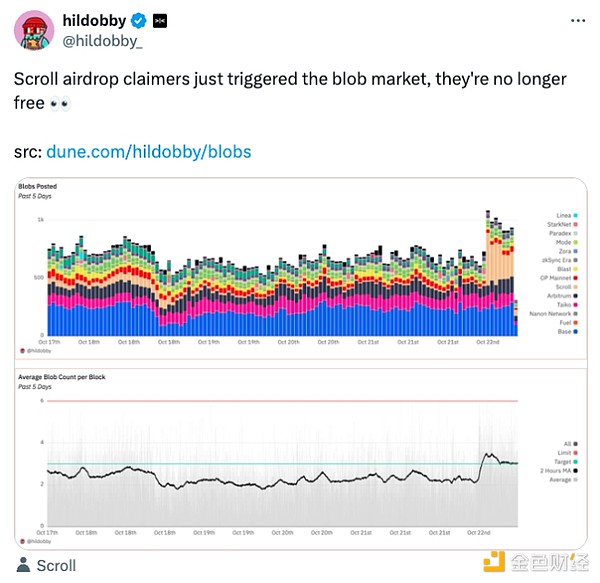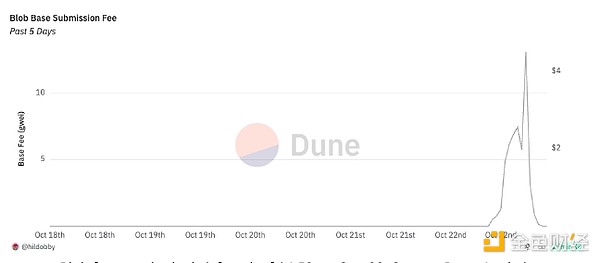Written by: Tom Mitchelhill, CoinTelegraph
Translated by: Wu Zhu, Jinse Finance
A recent frenzy over airdrop claims for a new Ethereum Layer 2 network called Scroll briefly drove up blob fees to as high as $4.52, marking the third time blob costs have surged since the Dencun upgrade in March.
Anonymous crypto data analyst Hildobby stated in a post on X on October 22: "The Scroll airdrop claims have just triggered the blob market; they are no longer free."
He attributed the rise in blob fees to the airdrop of Scroll, which listed its governance token SCR on Binance and airdropped tokens to its users on October 22.

Source: Hildobby
According to data from Dune Analytics, blob fees reached a four-month high of $4.52 on October 22.
The significant spike in blob prices had only occurred twice before—once during a surge in L2 activity in July and again on March 27 during the launch of Blobscriptions, a protocol that allows users to write data directly into blobs.
The increase in blob fees is a double-edged sword for Ethereum. More expensive blobs lead to more blob gas being paid to the network; however, they also raise the associated costs of executing transactions and transfers on Ethereum L2s.

On October 22, blob fees peaked at $4.52. Source: Dune Analytics
Notably, as L2 activity slowed, blob fees quickly retreated, with costs dropping to nearly zero at the time of publication.
Just a month ago, Ethereum co-founder Vitalik Buterin emphasized this point in a speech in September. The "blob count" (the maximum number of available blobs per block) was nearing full capacity, and if not addressed, it could soon hinder Ethereum's scalability.
A few weeks later, on October 18, Ethereum developers announced a new Ethereum Improvement Proposal (EIP) aimed at increasing the current fixed "blob count"—the maximum number of available blobs per block.
Christine Kim, Vice President of Research at Galaxy Digital, stated that EIP-7742 would create a mechanism for the Ethereum consensus layer to "dynamically" set blob gas targets and maximums, enhancing network scalability in the upcoming Pectra upgrade.
Blobs were introduced as part of the March Ethereum Dencun upgrade, which primarily aimed to reduce transaction costs on Ethereum L2 networks.
With the introduction of blobs and original danksharding, transaction fees on Ethereum L2 have significantly decreased. Swap fees on Arbitrum plummeted from around $1.25 to below $0.02, while Polygon fees also dropped by a similar amount.
Notably, Ethereum developer Dan Cline managed to write the entire Bee Movie script onto the Ethereum mainnet for just $14, showcasing the cost-saving potential of blobs as temporary data storage units.
免责声明:本文章仅代表作者个人观点,不代表本平台的立场和观点。本文章仅供信息分享,不构成对任何人的任何投资建议。用户与作者之间的任何争议,与本平台无关。如网页中刊载的文章或图片涉及侵权,请提供相关的权利证明和身份证明发送邮件到support@aicoin.com,本平台相关工作人员将会进行核查。




